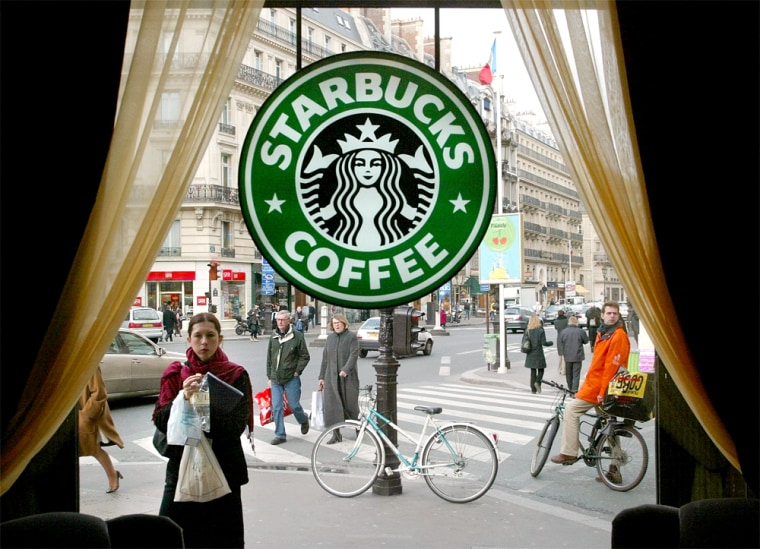Starbucks has finally arrived in the country that likes to think it invented the cafe.
Almost six years after it began establishing itself in Europe — starting with Britain, Switzerland and Austria — Starbucks Corp. inaugurated its first Paris store Thursday, with Spanish partner Grupo VIPS.
The king of Frappucinos-to-go nevertheless accepts it may not be easy to make ends meet right away in a country where people still like to sit down to drink their “express,” preferred short, black, bitter — and above all, cheap.
“Our success in other countries does not provide us with an entitlement to be successful in France,” Starbucks CEO Howard Schultz told The Associated Press.
Research has shown the French remain skeptical about “whether coffee from America can measure up,” Schultz conceded, but they are aware of the Starbucks brand — and “their curiosity will drive them into the stores.”
When the first branch, at Avenue de l’Opera, opens to the public on Friday, customers will find familiar croissants and pains au chocolat — a selection made in an effort to lessen the culture shock.
High costs a factor?
Some business insiders say it wasn’t cultural resistance that delayed Starbucks’ entry into the French market — but high costs.
Executives from four major French food companies said they turned down offers from Starbucks to form a joint venture in this notoriously difficult market.
“Their contract was way too expensive,” said Jean-Paul Brayer, former head of Groupe Flo, the French reference company in upmarket chain restaurants, which declined a Starbucks offer in 2000. “It was a win-win situation — but only for Starbucks.”
Hamburger chain Quick and restaurant groups Elior and Le Duff said they also rebuffed offers from Starbucks.
Schultz dismissed as “rumors and speculation” the suggestion he initially wanted a local partner. But he acknowledged having wide-ranging talks with French firms.
“Many of those conversations were not so much about partnering but learning about doing business in France and sharing information about their experience,” Schultz said. “We were in discussions with lots of people, never made a proposal.”
Seattle-based Starbucks sees its international business posting an operating profit overall in fiscal 2004 for the first time in an eight-year global expansion drive.
Another outlet opens Monday in the La Defense business district, the second of about 10 planned for Paris in the next year.
French habits changing
There are already some signs that French coffee drinkers are ready for a change.
A recent study by the UMIH industry association showed that the traditional bistros and cafes it represents have been closing at a rate of about 1,500 a year for the past two decades, as lunch breaks contracted and takeout sandwich bars flourished.
The organization’s president, Andre Daguin, nevertheless remains calm in the face of adversity — and Arabian Mocha Java.
“The first cafe was founded in Paris over 300 years ago,” Daguin said, referring to Le Procope, a Latin Quarter eatery that claims to be the world’s oldest restaurant still open for business.
“Starbucks is not going to compete with the French cafe,” he said. “The cafe isn’t just somewhere to drink coffee, it’s a place where people go for social contact. In a big place with hundreds of customers that’s more difficult.”
Another promising sign for Starbucks is the success of Columbus Cafe — a French-owned chain of coffee houses modeled on New York espresso bars.
Columbus has built up a network of about 40 stores with total sales of $11.4 million and tens of thousands of customers a week — just the kind of on-the-go French coffee drinkers Starbucks wants to attract.
The French firm’s founding co-chairman, Philippe Bloch, said he anticipated his new rival and is one year into an expansion based on a move into franchising.
Bloch believes high French labor costs will help reduce the impact of economies of scale enjoyed by Starbucks, with global revenue of $4.1 billion and huge buying power.
But he cheerfully accepts that the coming of the global coffee behemoth could spell the most serious threat so far to his company’s decade-long existence.
“It’s a bit like going into a nuclear war with a knife,” he said of the competition.
